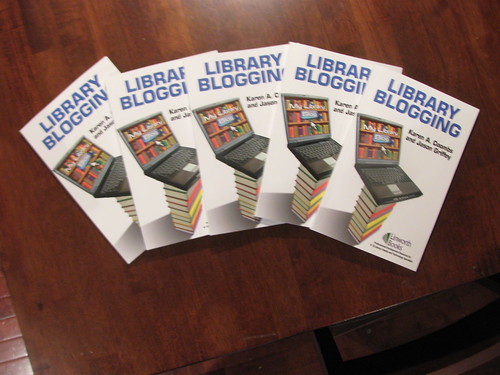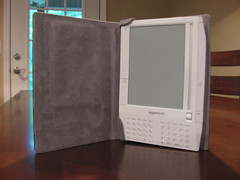Inspired by Amanda, here’s my Wordle tag cloud from del.icio.us. It’s really pretty enough to print and hang on my wall.
Author: griffey
Jason Griffey is the Executive Director of the Open Science Hardware Foundation. Prior to joining OSHF, he was the Director of Strategic Initiatives at NISO, where he worked to identify new areas of the information ecosystem where standards expertise was useful and needed. Prior to joining NISO in 2019, Jason ran his own technology consulting company for libraries, has been both an Affiliate at metaLAB and a Fellow and Affiliate at the Berkman Klein Center for Internet & Society at Harvard University, and was an academic librarian in roles ranging from reference and instruction to Head of Library IT and a tenured professor at the University of TN at Chattanooga.
Jason has written extensively on technology and libraries, including multiple books and a series of full-periodical issues on technology topics, most recently a chapter in Library 2035 - Imagining the Next Generation of Libraries by Rowman & Littlefield. His latest full-length work Standards - Essential Knowledge, co-authored with Jeffery Pomerantz, was published by MIT Press in March 2025.
He has spoken internationally on topics such as artificial intelligence & machine learning, the future of technology and libraries, decentralization and the Blockchain, privacy, copyright, and intellectual property. A full list of his publications and presentations can be found on his CV.
He is one of eight winners of the Knight Foundation News Challenge for Libraries for the Measure the Future project (http://measurethefuture.net), an open hardware project designed to provide actionable use metrics for library spaces. He is also the creator and director of The LibraryBox Project (http://librarybox.us), an open source portable digital file distribution system.
Library Blogging
It’s here! It’s really here! For more news about the book, and general updates and such, visit the blog for the book: Library Blogging. I’ll talk more after I’ve had a chance to review it again, but so far it looks great.
For those going to ALA, Linworth Publishing is booth #2553, if you want to stop by and pick up a copy of the book.
Kindle in flames?
Two days before I received my Kindle, Roy Tennant published an article on his Digital Libraries blog entitled “Prediction: The Kindle goes down in flames“. I normally agree with Roy on lots of things, but this is a topic where I’m going to pick on him a little.
Let’s rewind to October of 2001, where a plucky little company named Apple released a strange new product called an iPod. With 5 gigabytes of storage, this pocket-sized marvel cost….$399. What did it do? It played music. That’s all it did. Moreover, it only connected to your computer via an esoteric plug called “Firewire” that 90% of the personal computers in the world didn’t have.
It took Apple 3 financial quarters to sell over 200,000 of them, and it wasn’t until 2004 and the cost per gigabyte dropped under $20/GB and the iPod was on it’s third generation that sales really took off.
The Kindle, for all the publicity it has garnered, is only 8 months old. Is it the perfect reading device? I’m not sure yet. I’ve been consuming ebooks for years, beginning with reading them on my Handspring Visor Deluxe in mid-2000. I’ve read them on cell phones, computer screens, and other PDA’s. And I can say without any reservation that after 24 hours with the Kindle that it is a completely new and better reading experience.
The advantages for the Kindle are twofold: a device customized for reading makes reading easier, and the device comes from Amazon. The Kindle is great for reading, not suffering from the issues that, for example, the iPhone might…primarily the issue that an LCD screen just isn’t very good for reading in any form of bright light. The device is driven by Amazon, who has the reach and power in the publishing industry to get books for the device (take a look at the difference between any other ebook provider’s numbers and Amazon’s). Amazon also has the infrastructure to support immediate electronic delivery of any ebook they carry, directly to the device. Anyone else doing that?
The Kindle does several things (it does not, contrary to Tennant’s assertion “only read books”). It allows for reading, annotating, bookmarking, dictionary lookup, and other common reading chores. It also comes with permanent free cellular internet service. Amazon Whispernet gives you, while not a full web experience, a browser and access to the ‘net anywhere you can get a Sprint cell signal. For no additional cost past the cost of the device. Seriously, how much is that worth over a year?
With all that said, I’ve only had the Kindle for less than 48 hours. I wasn’t going to buy one so early in the development cycle, but do I regret having one now? Hell no. It’s a marvelous piece of technology for readers, and I fully expect that in a couple of years I’ll still be toting it around from conference to conference in lieu of a few pounds worth of wood pulp.
If anyone wants to take a look at the Kindle, find me at ALA Annual, and I’ll happily let you play with it. Just holding it, seeing the screen, and seeing how much thought went into the design will make a difference, I promise.
Steve Lawson, in the comments, pointed out something that I wanted to address. Tim O’Reilly, in a comment on Roy’s post, says:
“I also struggle with Amazon’s DRM and sole-source approach, which seems to me to be a flawed copy of Apple’s iPod strategy, missing not only Apple’s brilliant design but also the positive externality that consumers could easily add their own music collection to the device by ripping mp3s.â€
I am no fan of DRM, and I admit that it gives me pause regarding the Kindle. That said, the “sole-source” approach isn’t true…the Kindle happily ingests any .mobi file you want, and there are plenty of places sourcing native Kindle files of public domain books. First thing I did was put a few dozen of my favorite classics on there, for free. As well, if I had an easy way to digitize the books I already own (in the same rough manner of the digitization of my CDs) I would be doing it, and adding them. The issue there isn’t with the Kindle, it’s that there is no easy digitization of dead trees.
I haz a Kindle!
Gonna be hard to top this Father’s Day present next year, but for my very first Father’s Day, Eliza and Betsy got me a Kindle! (yes I know it’s not quite Father’s Day…sue me, they gave it to me early.)
So far, the thing is really intriguing. The display is magical, the closest thing to paper I’ve ever seen for readability, and it took me about 3 minutes of using it to get used to the controls. The UI could be slight springier, with just a bit of lag between button press and effect, but again, I think something I’ll get used to quickly.
The downside? No EVDO service in Sewanee, which means no impulse buys while laying in bed. That’s actually probably not a downside, now that I think about it.
Anyway, if anyone wants to play with a Kindle, find me at ALA…I’ll have it with me.
My latest insanity
I announced it on the Twitter, but thought I should record my latest questionable decision here for posterity: I’ve been named Chair of the LITA Program Planning Committee for 2008-2010.
Hopefully this blog won’t devolve into a bitchfest regarding this decision.
Again, so very quiet
Very quiet around Pattern Recognition these days, and I apologize. I’m still trying to find the balance between the microblogging I’m doing over on Twitter, and the longer form stuff I’m now writing over at TechSource…not to mention the family-oriented, Eliza-centered writing/photography over at Brand New World. I’ve fractured myself!
So, my goal is now to use Pattern Recognition as something between Twitter and longer-form, at least for now. There’s a lot of stuff percolating, as always, and I’m never quite sure where it will end up. Stay tuned, though. I promise it won’t be quiet forever.
Very soon, you too can own this very lovely book. Proofs are done, galleys are done, everything on our end is done, done, and done. We’re officially at the printers, folks!
Library Blogging is suitable as a gift for any occasion, and you can pre-order now (pre-order? No, just order, I think) at Amazon…go here and order! Or just wait until I have dozens of copies that I can’t possibly get rid of, and offer me a couple of bucks. Your choice.
I think you’re doing it wrong
Betsy surprised me a few days ago with this, which she claims is either a late birthday or early father’s day present: a signed, numbered, limited edition of Snow Crash by Neal Stephenson.
It’s put out by Subterranean Press, and is gorgeous. Subterranean is a press that specialized in high quality printings of limited edition fantasy, scifi, and horror…I want to own nearly everything they print.
But for now, I will just stare and covet my copy of my preciou….I mean, Snow Crash.
Your BIGWIG
I’m very, very excited to announce the next step in the continuing attempt to take over the world illustrate modern communication methodologies and community building for the larger LITA and ALA types:
This is a place for members and potential members and interested parties of the LITA Interest Group BIGWIG to gather, talk, and most importantly: do stuff. The site is open…anyone can create an account and participate in the site, add content, etc. It gives us a place to meet virtually, and a place where I hope good ideas are filtered and implemented. Consider it a BIGWIG-driven playground.
The site is Drupal based, and will be chock-full of open source goodness over time. We’ll also continue to experiment with Web 2.0 tools and hope that people use the site to do so.
So: Join us virtually, and then decide if you want to join us at conferences and such. Either way, we’re happy to have you participate in our playing. Come join us!





